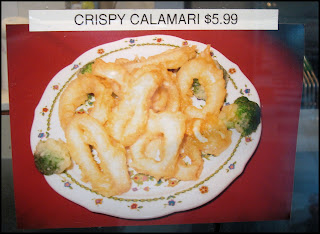 People often assume to know my position on English Only laws and proposals – but my take is nuanced and complicated. Linguistic integrity is an interesting idea – but it hasn’t been tried yet.
People often assume to know my position on English Only laws and proposals – but my take is nuanced and complicated. Linguistic integrity is an interesting idea – but it hasn’t been tried yet.
WHY do Asian menus refer to squid by an Italian word? The picture comes from a Japanese restaurant – examples like it can be found in most Chinese menus. Is the assumption that Americans developed a taste for squid only because they don’t know what it really is? Chinese menus should call it Yo Ewe, (乌贼 or “oil fish,” which reminds you of the high cholesterol). I’d like to know what it’s called in Japanese (FYI: Octopus is called “taco” in Japan). And do people who support English only legislation eat Mexican food? If so what do they call tortillas? Or tacos? Are there “English” words for these?
I suspect a royal order of linguistic prejudice. In America monolingual speakers code-switch according to a hierarchy of non-English languages: French and German come first, followed by other languages spoken by white WASPish countries, then Japanese, other Asian languages – the least popular language to gather words from is Chinese. This explains why there are so few cognates and why Americans use the word “Kangi” in the least appropriate circumstances.
“Kan gi” (or Kanji) – is Japanese language way to say “Chinese characters,” as in (Kan = Chinese) + (gi = characters) – but American hipsters will refer to Chinese characters as “kangi,” even when discussing texts in and/or from China! Boing boing – one of my favorite blogs – is a great place to find this. See comments – here – where if you scroll to comment #57 you can see where I have broached this issue , or here (scroll thu comments) where moderators and commentators alike use a Japanese phrase to say the word Chinese when talking about China. It amounts to China bashing.
要在憂患恥辱的環境裡,創造我們自力更生的新生活。..................................................